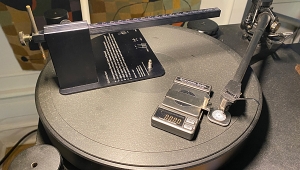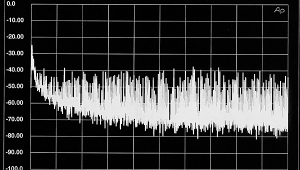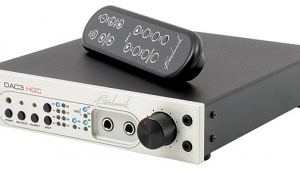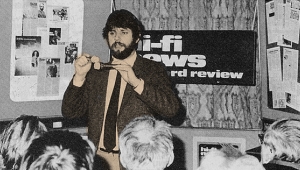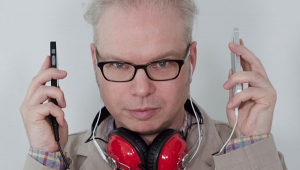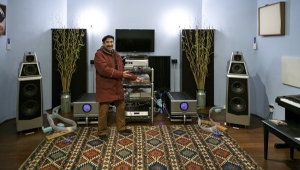| Columns Retired Columns & Blogs |
Fate, I Defy You: The Robert Silverman Liszt CD Sidebar 2: Robert Silverman
Sidebar 2: Robert Silverman
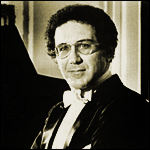 Robert Silverman is perhaps best-known in his native Canada, where he has performed with major orchestras from coast to coast. But he has also appeared, to outstanding reviews, with the Chicago Symphony and the Boston Pops, and in New York, Washington, London, Paris, Budapest, Hong Kong, Rio de Janeiro, and the former Soviet Union.
Robert Silverman is perhaps best-known in his native Canada, where he has performed with major orchestras from coast to coast. But he has also appeared, to outstanding reviews, with the Chicago Symphony and the Boston Pops, and in New York, Washington, London, Paris, Budapest, Hong Kong, Rio de Janeiro, and the former Soviet Union.
His repertoire ranges from Bach to Mozart to Gershwin to new age to contemporary—including the first performance in Canada of George Crumb's Makrokosmos.
He has made over a dozen recordings: for Stereophile, CBC Records/Les disques SRC, Musica Viva, Orion, and Marquis. His recording for CBC of Michael Baker's Piano Concerto (a work written for and dedicated to Silverman) won a 1991 JUNO Award, while his first recorded Liszt recital won a Grand Prix du Disque from the Liszt Society of Hungary, resulting in an invitation to give the annual all-Liszt recital in Budapest to honor that composer's birthday. Other than Intermezzo (1991) and Concert (1994) for Stereophile, his most recent recordings have been of piano music by Cesar Franck (Musica Viva MVCD 1061, 1993) and of 19th-century popular "chestnuts" performed on an 1898 parlor piano, The Parlour Grand (Marquis ERAD 161, 1995).
In 1996, the Canadian OrpheumMasters company was about to release a two-CD collection of Robert Silverman's early analog recordings. Included will be the Liszt set that won the Grand Prix du Disque—including the Variations on J.S. Bach's "Weinen, Klagen, Sorgen, Zagen," and the Transcendental Etudes 10 and 11—and Silverman's performance of the eight Preludes written in 1948 by the Swiss composer Frank Martin, the original release of which had been proclaimed a "Recording of Special Merit" by Stereo Review.
Although he gave his first recital at the age of five and made his debut with the Montreal Symphony Orchestra when he was 14, Robert Silverman began his college education as an engineering major, completing three years of study in that field. The call of music was too strong, however; he completed his BA in the humanities, spent two years studying in Vienna, and finished his formal musical education at McGill University and the Eastman School of Music. During this period, a string of prizes and medals in the Rio de Janeiro, Busoni, and Viana da Motta International Piano Competitions culminated in 1967 with the Grand Prize in the prestigious Concours Jeunesses Musicales.
Robert Silverman presently divides his time between teaching at the University of British Columbia, where he is Director of the School of Music, and performing. I spoke with him about his feelings for the music of Liszt on the eve of his departure for a concert tour of Romania and the Czech Republic:
Robert Silverman: I discovered Liszt at a very important time in my life. I was in my late teens and I had not yet been studying as seriously as many other young pianists do. Hearing Liszt—the work was the First Piano Concerto—it was just like I had been hit by a truck! I didn't yet know enough to know that in some quarters Liszt's music is looked on as being too theatrical and too sentimental. In my innocence, I could just hear one of the most astonishingly original composers who's ever lived. Even as a youngster I had a sense for the harmonic workings of a piece, which is why most of the pieces I play are tonal—I am just so fascinated by what can be accomplished within that musical system—but then to hear what Liszt does with it, the way he was stretching it, caught me at a young age.
As I got older and, let's say, became a more sophisticated musician, my youthful enthusiasm for this composer never left me. Every so often, I return to Liszt and it brings me back to being a 17-year-old kid, reveling in the excitement, and the muscularity, and the incredible lyricism...He's such a rich composer. There are the odd works by Liszt that are indebted to Chopin in some ways, the Consolations and maybe even Liebestraum [track 8], but Liszt was really into his own thing. Whereas Chopin was making the piano sound like a piano, as only Chopin could, Liszt was creating an orchestra with his instrument.
John Atkinson: There are some passages in the B-Minor Sonata, like the climactic arpeggio before the closing Andante Sostenuto [track 3, 7:36], which literally scare me. You have the pedal down and you're playing a series of notes that basically excites the whole fabric of the piano—every string seems to be ringing—yet it still sounds ordered and in control.
Silverman: I think probably of all the pieces in the piano repertoire, the Liszt Sonata speaks to me in a very special way, more personally than almost any other work I play. Again, it goes back to my past. When I was in my early 20s, I had been deeply disappointed in a love affair. It's almost like something straight out of the 19th century—I literally learned the piece in three weeks! I wouldn't want to hear those performances now, but I was just so wrapped up in the "theatricality" of the piece.
I was absolutely driven to learn it, and I've come back to it many times. I find so many things about the Sonata fascinating. First of all, its overall structure: Liszt takes all the sections of a normal sonata Allegro movement and expands them to the point where each section becomes almost movement-length by itself. You can divide the piece up in so many different ways and have it make sense, but I really feel very strongly that I see the piece as a whole. When I'm starting to play it, I'm standing on my tiptoes so that I can see over the horizon to the end.
- Log in or register to post comments

